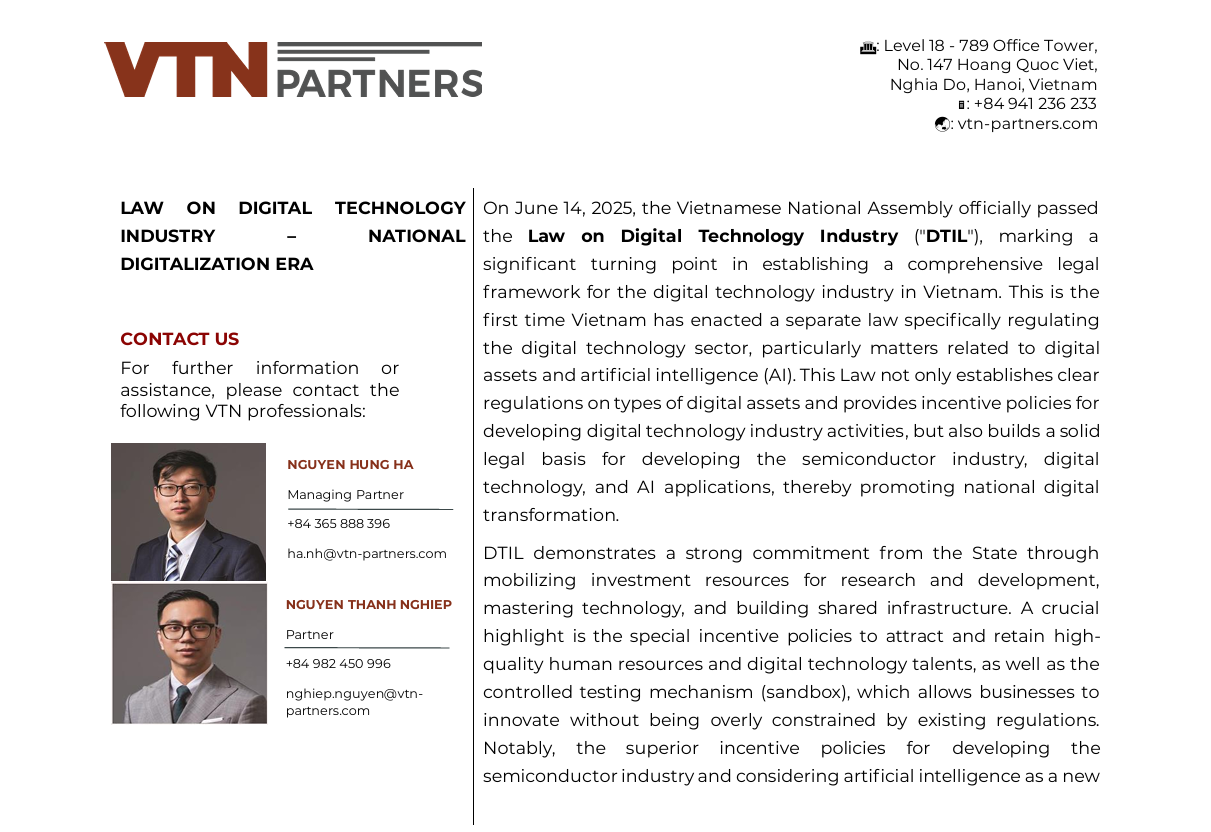In the digital economy era, the integration of advanced scientific and technological innovations has permeated all facets of life, including the economy, culture, and society. Among these innovations, smart contracts (“SC”) are recognized as a groundbreaking development, offering significant advantages such as automation, transparency, and security. However, the swift pace of technological advancement has outstripped the development of corresponding legal frameworks. Recognizing the potential of SC, Vietnam has emerged as a notable hub for investment, development, and application of SC. Nevertheless, specific legal regulations governing smart contracts in Vietnam are still absent.
1. Legal Validity of Smart Contracts
The Electronic Transactions Law 2023 encompasses regulations on electronic contracts (“e-contracts”), defining them as contracts formed through data messages. A data message is information generated, sent, received, and stored via electronic means, including hardware, software, information systems, or other technologies like information, electrical, electronic, digital, magnetic, wireless transmission, optical, or electromagnetic technology.
Under this framework, SC can be classified as a type of electronic contract that operates through automated information systems. The Electronic Transactions Law 2023 explicitly acknowledges the automation of information systems and affirms their legal validity without requiring human intervention: An e-contract is deemed valid if concluded or executed via interaction between an automated information system and a person, or among automated information systems, and its legal value is upheld regardless of the lack of human inspection or intervention.
Despite the recognition of electronic transactions’ legal validity, the Electronic Transactions Law 2023 does not explicitly equate the legal validity of SC with that of e-contracts.
2. Conditions for the Validity of Smart Contracts
Smart contracts, akin to other civil transactions, must satisfy the general conditions for validity as outlined in the Civil Code Law 2015, which include:
- Legal personality and capacity of participants.
- Voluntary participation of parties.
- Lawful and ethical purpose and content.
However, establishing legal personality, capacity, and voluntariness in SC formation is challenging. The encoded information in SCs is user-generated and transmitted through networks and computers without state or intermediary verification prior to contract conclusion.
3. Contract Performance
The immutability of SCs means contract terms cannot be altered or unilaterally terminated once encoded. This rigidity impacts parties’ civil rights, including the rights to amend (Article 421), terminate (Article 422), rescind (Articles 423-426), or unilaterally terminate the contract (Article 428). Even in cases of fundamental changes or force majeure, amending or terminating an SC on the blockchain is difficult. To mitigate this, parties must anticipate possible changes and encode these contingencies, or draft new SCs with revised programming.
4. Payment Methods
Virtual currency is the prevalent payment method for SCs. However, Vietnamese law does not officially recognize virtual assets and cryptocurrencies, creating obstacles in contract performance. Article 105 of the Civil Code Law 2015 does not categorize electronic money as an asset. According to Official Dispatch 5747/NHNN-PC dated July 21, 2017, the State Bank of Vietnam does not recognize Bitcoin and similar virtual currencies as legal tender or valid payment means. Consequently, cryptocurrencies are not treated as goods or services under Vietnamese law, exempting them from taxation, complicating tax determination on income and transactions in SCs.
5. Dispute Resolution
While SCs’ automation reduces arbitrary modifications and unilateral terminations, disputes can still arise from coding errors, incorrect data entries, or payment failures. Currently, Vietnamese law lacks specific mechanisms for SC dispute resolution. Disputes may be resolved under traditional contract dispute regulations, but the use of programming languages in SC clauses poses challenges for judges, arbitrators, and mediators in understanding and adjudicating disputes. Additionally, determining compensation methods is difficult when virtual currency is the payment medium. The automation and immutability of SCs also hinder court proceedings, as ongoing transactions cannot be halted through temporary emergency measures.
Conclusion
Smart contracts present complex technical and legal challenges. While Vietnamese law contains some SC-related provisions, it has not yet fully recognized their legality. Consequently, the practical application of SCs remains limited. Developing an appropriate legal framework requires thorough technical and market trend analysis to address legal obstacles and potential risks associated with SCs.
#econtract #smartcontract #Vietnameselaw #VTN








